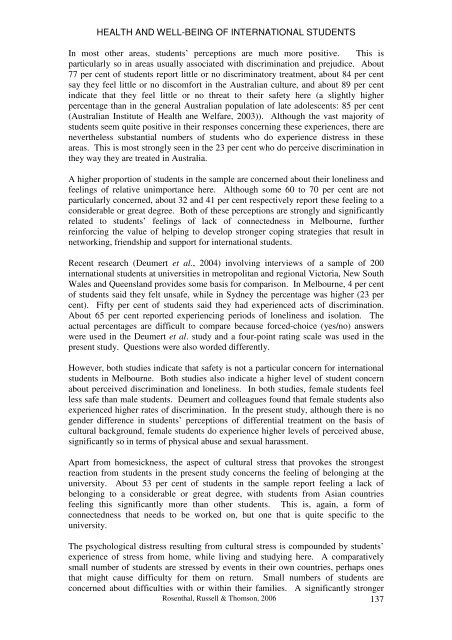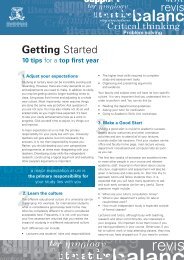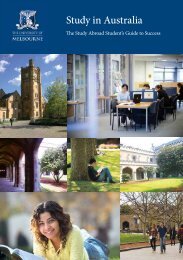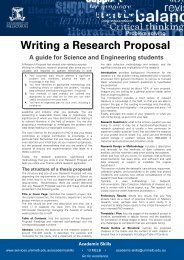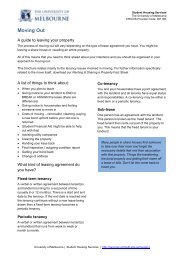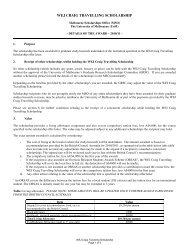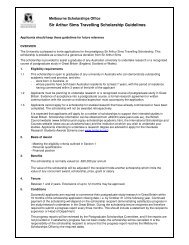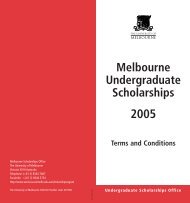a growing experience - Student Services - University of Melbourne
a growing experience - Student Services - University of Melbourne
a growing experience - Student Services - University of Melbourne
You also want an ePaper? Increase the reach of your titles
YUMPU automatically turns print PDFs into web optimized ePapers that Google loves.
HEALTH AND WELL-BEING OF INTERNATIONAL STUDENTSIn most other areas, students’ perceptions are much more positive. This isparticularly so in areas usually associated with discrimination and prejudice. About77 per cent <strong>of</strong> students report little or no discriminatory treatment, about 84 per centsay they feel little or no discomfort in the Australian culture, and about 89 per centindicate that they feel little or no threat to their safety here (a slightly higherpercentage than in the general Australian population <strong>of</strong> late adolescents: 85 per cent(Australian Institute <strong>of</strong> Health ane Welfare, 2003)). Although the vast majority <strong>of</strong>students seem quite positive in their responses concerning these <strong>experience</strong>s, there arenevertheless substantial numbers <strong>of</strong> students who do <strong>experience</strong> distress in theseareas. This is most strongly seen in the 23 per cent who do perceive discrimination inthey way they are treated in Australia.A higher proportion <strong>of</strong> students in the sample are concerned about their loneliness andfeelings <strong>of</strong> relative unimportance here. Although some 60 to 70 per cent are notparticularly concerned, about 32 and 41 per cent respectively report these feeling to aconsiderable or great degree. Both <strong>of</strong> these perceptions are strongly and significantlyrelated to students’ feelings <strong>of</strong> lack <strong>of</strong> connectedness in <strong>Melbourne</strong>, furtherreinforcing the value <strong>of</strong> helping to develop stronger coping strategies that result innetworking, friendship and support for international students.Recent research (Deumert et al., 2004) involving interviews <strong>of</strong> a sample <strong>of</strong> 200international students at universities in metropolitan and regional Victoria, New SouthWales and Queensland provides some basis for comparison. In <strong>Melbourne</strong>, 4 per cent<strong>of</strong> students said they felt unsafe, while in Sydney the percentage was higher (23 percent). Fifty per cent <strong>of</strong> students said they had <strong>experience</strong>d acts <strong>of</strong> discrimination.About 65 per cent reported experiencing periods <strong>of</strong> loneliness and isolation. Theactual percentages are difficult to compare because forced-choice (yes/no) answerswere used in the Deumert et al. study and a four-point rating scale was used in thepresent study. Questions were also worded differently.However, both studies indicate that safety is not a particular concern for internationalstudents in <strong>Melbourne</strong>. Both studies also indicate a higher level <strong>of</strong> student concernabout perceived discrimination and loneliness. In both studies, female students feelless safe than male students. Deumert and colleagues found that female students also<strong>experience</strong>d higher rates <strong>of</strong> discrimination. In the present study, although there is nogender difference in students’ perceptions <strong>of</strong> differential treatment on the basis <strong>of</strong>cultural background, female students do <strong>experience</strong> higher levels <strong>of</strong> perceived abuse,significantly so in terms <strong>of</strong> physical abuse and sexual harassment.Apart from homesickness, the aspect <strong>of</strong> cultural stress that provokes the strongestreaction from students in the present study concerns the feeling <strong>of</strong> belonging at theuniversity. About 53 per cent <strong>of</strong> students in the sample report feeling a lack <strong>of</strong>belonging to a considerable or great degree, with students from Asian countriesfeeling this significantly more than other students. This is, again, a form <strong>of</strong>connectedness that needs to be worked on, but one that is quite specific to theuniversity.The psychological distress resulting from cultural stress is compounded by students’<strong>experience</strong> <strong>of</strong> stress from home, while living and studying here. A comparativelysmall number <strong>of</strong> students are stressed by events in their own countries, perhaps onesthat might cause difficulty for them on return. Small numbers <strong>of</strong> students areconcerned about difficulties with or within their families. A significantly strongerRosenthal, Russell & Thomson, 2006 137


